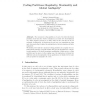Free Online Productivity Tools
i2Speak
i2Symbol
i2OCR
iTex2Img
iWeb2Print
iWeb2Shot
i2Type
iPdf2Split
iPdf2Merge
i2Bopomofo
i2Arabic
i2Style
i2Image
i2PDF
iLatex2Rtf
Sci2ools
DLT
2007
2007
Coding Partitions: Regularity, Maximality and Global Ambiguity
The canonical coding partition of a set of words is the finest partition such that the words contained in at least two factorizations of a same sequence belong to a same class. In the case the set is not uniquely decipherable, it partitions the set into one unambiguous class and other parts that localize the ambiguities in the factorizations of finite sequences. We firstly prove that the canonical coding partition of a regular set contains a finite number of regular classes. We give an algorithm for computing this partition. We then investigate maximality conditions in a coding partition and we prove, in the regular case, the equivalence between two different notions of maximality. As an application, we finally derive some new properties of maximal UD codes.
Canonical Coding Partition | Coding Partition | DLT 2007 | Theoretical Computer Science | finest Partition |
| Added | 29 Oct 2010 |
| Updated | 29 Oct 2010 |
| Type | Conference |
| Year | 2007 |
| Where | DLT |
| Authors | Marie-Pierre Béal, Fabio Burderi, Antonio Restivo |
Comments (0)

